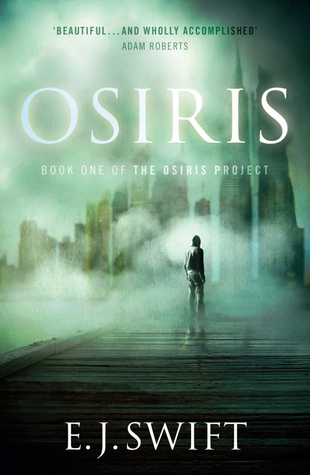I like my Kindle, but the sample chapters you can download aren’t enough. I have to give a book 100 pages before I know whether it’s worth persevering with. So after downloading the beginning of Osiris, I found myself enjoying it, but not really getting into it enough to actually shell out some dough and stop being tight.
Fast-forward a couple of years and I see the book in the local Book Cycle, a place where you can donate some money and just walk away with books. 50p later (yeah yeah, I’m tight) I’m walking away with a book that I half-remember had a decent opening and looking forward to getting stuck into some reading.
Osiris is the last city on Earth, a Utopian experiment battered by extreme weather and climate change so badly that it functions improperly, the East maintaining an acceptable standard of living for its inhabitants and the West containing refugees and the brutalised poor, kept out of the East and at bay by a ring fence and patrolling Home Guard who show no mercy when it comes to keeping the borders tight.
The story revolves around two characters; one a hedonistic celebrity and member of an illustrious family, the other a politicised refugee. Adelaide is the granddaughter of the Architect, founder of the city, searching for her missing twin, whom she believes alive and possibly held by her family as part of an elaborate cover-up. She uses the abilities Vikram gained from his morally-grey past in the West, to assist in her own investigations into her brother’s disappearance. Vikram on the other hand, uses Adelaide and her connections to gain audience with the City Council, on which her family sit, to plead for aid for the West.
The speed at which the character’s lives enmesh is spectacular, each seeing the other’s lives through a new lens whilst being dragged down in each others scheming, almost hating what they are doing but realising they’re too involved to back out.
Swift has a knack of drip-feeding just the right amount of information to enable you to hate some of her characters, by which I mean their motives are obviously driven by things much more complex than you, the reader are privy to. You can hate Theresa May or Jeremy Corbyn, but you will never know the full journey of how they came to arrive at their beliefs. Similarly, Swifts characters are more than 2D baddies, and their motives are tantalisingly under the surface, they believe what they are doing is right, but they’re damned if they’re going to justify themselves to the likes of you.
It is remarkably done, and leads to you hating the actions of both Easterners and Westerners as their own concerns impede the actions of both Adelaide and Vikram.
In short, the novel barrelled along, the dialogue and scenes were crisp and the characters multi-layered and involved. I will be purchasing the sequel(s), in full price, and will not be so tight in future.

